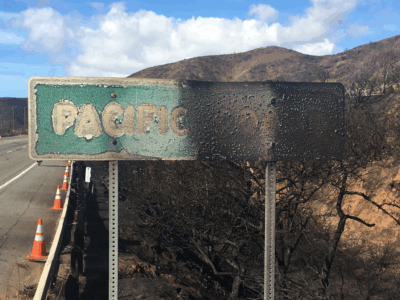Whither WOTUS?
Trump ordered agencies to reconsider Clean Water Act jurisdiction. Easier said than done.
President Trump ordered EPA and the Army Corps to review the Obama Administration’s WOTUS rule, which sets expansive bounds on federal jurisdiction over water bodies and wetlands. The agencies have sent the White House a proposal to rescind the WOTUS rule and revert to earlier rules until they can come up with a replacement. In my view, either the agencies will have to dive deep into the scientific thicket in the hope of justifying a new rule, or they will have to gamble that Trump will get another Supreme Court appointment before their action gets to the Court.
THE CURRENT STATE OF PLAY
To set the stage, WOTUS (short for “Waters of the United States”) is a response to the Rapanos decision, in which Justice Scalia and three others judges argued for a very narrow definition of federal jurisdiction over streams and wetlands, while Justice Kennedy adopted a more generous interpretation based on the existence of a nexus with traditional “navigable waters” – waterways that are suited to some kind of transport. There were four dissenters who wanted to extend jurisdiction even further than Kennedy, so there are five votes for going at least as far as Kennedy. President Trump issued an executive order directing the agencies to reconsider the scope of federal jurisdiction under the Clean Water Act, with particular attention to Scalia’s interpretation.
On February 28, EPA and the Army Corp issued a notice of proposed rule-making, announcing their desire to rescind or revise the Obama Administration’s WOTUS rule. It provides the following as the rationale for reconsideration:
Importantly, such a revised decision need not be based upon a change of facts or circumstances. A revised rulemaking based ‘‘on a reevaluation of which policy would be better in light of the facts’’ is ‘‘well within an agency’s discretion,’’ and ‘‘[a] change in administration brought about by the people casting their votes is a perfectly reasonable basis for an executive agency’s reappraisal of the costs and benefits of its programs and regulations.’’
All that is true, so long as the agencies can provide a reasoned explanation of their decision to reconsider and so long as they act within the outer boundaries of the statute. In terms of the direction of the rule-making, the agencies say publicly only that they wish to provide regulatory certainty and will consider (as Trump directed) revamping the decision along the lines of Justice Scalia’s plurality opinion in Rapanos. According to recent reports, their strategy is to first repeal WOTUS and then issue new guidance in a separate rule-making. They are currently soliciting the views of state governments about this radical change in federal wetlands protections.
In the meantime, the judicial review of the WOTUS rule is still pending. The Supreme Court declined the Administration’s invitation to put everything on hold pending a new rule-making and is continuing to consider whether the district courts or the courts of appeals have jurisdiction to review the rule. If the courts continue the process of reviewing WOTUS, the outcome could shape the degree of discretion of the agencies. Putting that unknown aside for the moment, the agencies face some difficult choices in their new rule-making process.
REINTERPRETING OR OVERRULING RAPANOS
The agencies’ options. Going with the Scalia approach has some difficulties. Nine circuits have decided that they are bound by Justice Kennedy’s nexus test. Faced with this, the agencies have three options:
- A different reading of Rapanos. They can argue that these courts are wrong about which of the Rapanos opinions is binding. But it seems unlikely those courts will agree, so the agencies would have to hope that Supreme Court would agree. This could become more likely if Kennedy is replaced by Trump.
- Overruling Rapanos. They could argue that the Supreme Court should simply reconsider the meaning of the statute, siding with Scalia and instead of Kennedy. Again, this would rely on getting a more favorable Supreme Court bench.
- Relying on Chevron Deference. Finally, they could argue that Kennedy was merely deferring to what was then agencies’s view rather than giving his own view of the statute. This is the only approach that doesn’t rely on a change at the Court.
If Kennedy’s opinion was based on deference to EPA’s view of the statute at that time, then the agencies are free to change their minds. Their new interpretation of the statute will also quality for deference if it is reasonable. But if Kennedy was giving his own interpretation of the meaning of the statute, then the agencies only hope is to change his mind or hope for a change in the make-up of the court. Thus, the meaning of Kennedy’s opinion is critical.
What did Kennedy mean? Since the third option is the appealing in terms of current law, I went back to Rapanos to see whether Kennedy was merely deferring to the agencies’ view rather than independently interpreting the statute. It seems clear that he rejected Scalia’s demand that streams flow constantly rather than intermittently on the merits, not just because it differed from the agencies’. Kennedy said:
“The plurality’s first requirement — permanent standing water or continuous flow, at least for a period of some months — makes little practical sense in a statute concerned with downstream water quality. . . . To be sure, Congress could draw a line to exclude irregular waterways, but nothing in the statute suggests it has done so.”
In rejecting Scalia’s insistence that wetlands have a surface water connection with streams. Justice Kennedy relied on evidence that even wetlands lacking such connection can have an impact on nearby water bodies, either due to pollution or because filling the wetland could result in silting. But he did seem to view the “significant nexus” test as part of the statute, not simply as one of many views that the agency might take:
With respect to wetlands, the rationale for Clean Water Act regulation is, as the Corps has recognized, that wetlands can perform critical functions related to the integrity of other waters — functions such as pollutant trapping, flood control, and runoff storage. Accordingly, wetlands possess the requisite nexus, and thus come within the statutory phrase “navigable waters,” if the wetlands, either alone or in combination with similarly situated lands in the region, significantly affect the chemical, physical, and biological integrity of other covered waters more readily understood as “navigable.” When, in contrast, wetlands’ effects on water quality are speculative or insubstantial, they fall outside the zone fairly encompassed by the statutory term “navigable waters.”
Based on the language, it seems to me, the agencies could adopt Scalia’s view, provided they can show that only wetlands meeting his criteria actually do have a significant nexus with traditional navigable waters. At the very least, they would need to show that this is true often enough to justify drawing a bright line there in the interest of regulatory certainty. But I doubt very much that they can make the scientific case. To do so, at the very least, they would need to rebut the mass of contrary scientific evidence amassed by the agencies when they issued the existing WOTUS rule. This will be a time-consuming process, and they may find it possible to assemble a plausible argument for Scalia’s arbitrary limitations.
PROCEDURAL ISSUES
Repealing WOTUS involves some procedural complications. The legal challenges to WOTUS are now pending in a number of different courts, and the Supreme Court is poised to decide whether jurisdiction is at the district court or appellate levels. Until that’s done, it’s not clear which courts could review a WOTUS repeal. In the meantime, there is a nationwide stay on WOTUS in from the Sixth Circuit, but the Supreme Court decision could determine the fate of that stay.
There’s also an issue of agency procedure that’s a bit unclear. If the agencies say the statute has only one reasonable interpretation, Scalia’s, they don’t need to build much of a factual record. But if the agencies say the statute is ambiguous, courts have started to merge their review of whether an agency’s interpretation is reasonable with the arbitrary and capricious test, which is usually used for factual and scientific issues. In that case, the agency might need to develop evidence to show that it’s interpretation is actually consistent with the statute’s purpose of protecting the water quality of waterbodies, despite quite a bit of evidence requires protecting wetlands that have a nexus with waterbodies.
We’ll know the answer to some of these questions when the repeal is released for notice and comment. Whatever ground it takes, the agency’s repeal effort is going to be challenged in court and could well be stayed, adding to the procedural confusion. The bottom line is that procedurally this is a bit of a mess. It’s even more of a mess because, until the Supreme Court decides the jurisdictional issue, we won’t even know which courts have jurisdiction to sort things out. Trying to separate the repeal of WOTUS from its replacement just seems to make things more complicated.
CONCLUSION
Putting aside the procedural issues, EPA may either have to make the case that its interpretation is reasonable and fulfills the purposes of the statute, or else that the statute is unambiguous and has only one possible interpretation. (which Kennedy and four dissenters got wrong in Rapanos). The second approach seems bolder, simpler, and more “Trumpian,” so I suspect they’ll make that their primary strategy.
Reader Comments
6 Replies to “Whither WOTUS?”
Comments are closed.







Dan, one more time, time is running out faster than most people realize and we must take our public communications/conversations to a much higher level today.
One example, disaster in progress, of what we are losing is Big Sur, in addition to never-ending environmental disasters throughout California..
I’m certain you LP folks have many examples, and we must find a better way to communicate. Students in a classroom are one thing at your command because they must pass your courses, but we must find better ways to teach and motivate people in the real world or continue to fail in the worst possible ways.
If we don’t learn how to communicate in ways to make peoples around the world stop, read and think long enough to inspire us to demand immediate environmental actions by our politicians, especially in this Trump/Congressional Era of Accelerating Environmental Disasters, then all we shall be left with are stories to tell our grandchildren about what we lost, and I guarantee you that you are not going to enjoy having to explain our failures to them.
The consequences of our failures to achieve “350 or Bust” are now officially a disaster on a daily basis.
My latest comment just keeps proving the worst case fact of life, that intellectuals cannot figure out how to communicate with the human race in order to inspire cooperation even when it means saving the human race from self-destruction we are experiencing today.
I’ll just keep following Churchill’s advice anyway, at least it worked during WWII, maybe someone can inspire us to make it work again before time runs out::
“Never, never, never give up.”
Anthony said;
“….“Never, never, never give up….”
Dear Anthony,
There are reports that President Trump will be giving up on the Paris climate treaty this week. For what its worth, some European leaders and California politicians intend to continue to mitigate climate change locally and on a personal level, with hope that others will follow and eventually become mitigators themselves.
As citizens of the greatest Nation on earth we enjoy the freedom to mitigate climate change in our personal lives. So turn off electricity, park your car, take a cold shower, eat vegetables, switch to solar energy and show others how we should abandon our carbon-driven lifestyles. Have a great Memorial Day.
May God Bless America.
Another interesting comment BQRQ, actually my usages of electricity, gas and water are so low I am billed at the lowest rates in all categories to the point where all my meters and services have been changed out and checked to make sure there are no errors. I have owned a hybrid car for almost 10 years as my only vehicle. For air conditioning and heating I open the windows in the summer and close them in the winter, and I have not watered my yards in over a decade, but I do live next to the ocean and this gives me many great lifestyle advantages. And my diet is so good that I have most amazingly made it to 80 with no health problems in sight, except that I do worry a lot for my grandchildren’s future quality of life that our Washington politicians are destroying.
Rereading your comment makes me wonder if LP is actually informing, teaching and motivating you to save the environment. Maybe you can teach them how to communicate and motivate the human race to survive.
Anthony asked;
“….your comment makes me wonder if LP is actually informing, teaching and motivating you to save the environment…..”
Dear Anthony,
Recently, I raised a question on Legal Planet regarding the purpose and intent of California’s climate mitigation regulations. Is the purpose of these regulations to mitigate the global climate or only the climate in California?
We recognize that California’s climate regulations are only applicable within the state of California and are not intended to effect the global climate. So we immediately recognize the complete futility and folly of attempting to mitigate climate only within California.
Climate mitigation has never worked because it has no measurable effect on climate – it does not “save” the environment. This undeniable and irrefutable truth is bad news for California’s climate regulators.
BQRQ, you illustrate a point that bothers me gravely, that the same people who claim to communicate with students are totally unable to inform, educate and motivate people whose future depends on their ability and willingness to communicate with us.
The Democratic Party leadership just failed to communicate with We The People to the point where they have no control over any branch of government, putting environmental protection in extremis.
So once again, political and intellectual leaders fail to protect one more civilization from self-destruction.